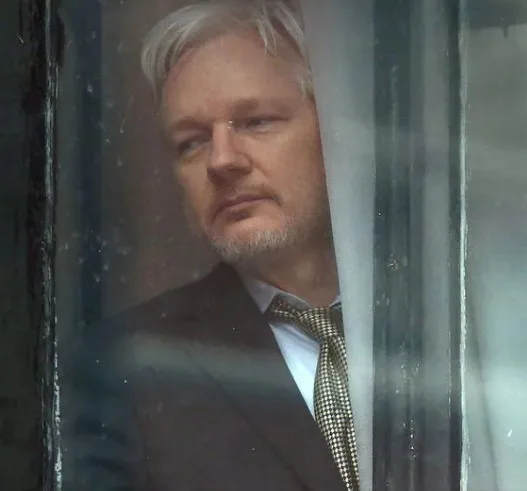Assange’s rights were violated by Spanish firm and the CIA while he was in the Ecuadorian embassy
By José María Irujo
A court in New York has ruled that UC Global and the Central Intelligence Agency (CIA) violated the constitutional rights and privacy of U.S. citizens when they met with Wikileaks founder Julian Assange at Ecuador’s embassy in London. Four U.S. citizens — two lawyers and two journalists — had sued former CIA Director Mike Pompeo, the CIA and David Morales, a former Special Forces soldier in the Spanish military who owned a Spanish surveillance firm that was contracted to provide security for the Ecuadorian Embassy in London.

Julian Assange
Judge John G. Koeltl’s decision acknowledged the violation of the plaintiffs’ rights by the employees of UC Global, who unlawfully photographed mobile phone passwords and contents when the four plaintiffs were visiting Assange in the embassy. However, the judge also ruled that UC Global’s recordings of conversations and photographs of passports at the embassy were not illegal because there is “no expectation of privacy [by the plaintiffs] in that embassy,” which is considered a public place.
The ruling is a win for the plaintiffs and poses a challenge for the CIA, as the plaintiffs will now seek the complete declassification of CIA documentation pertaining to the covert operation through the legal discovery process. An EL PAÍS investigation in 2019 uncovered audio and video recordings, emails and documents about UC Global’s illegal activities that were later presented as evidence by the plaintiffs. The judge decided that the plaintiffs presented “sufficient evidence” indicating Morales acted as an agent or collaborator of the CIA under by Mike Pompeo (who also served as Trump’s Secretary of State). The judge rejected the defendants’ motions to dismiss the entire complaint.
The lawsuit was filed in August 2021 by lawyers Margaret Ratner Kunstler and Deborah Hrbek, and John Goetz and Charles Glass, journalists specializing in national security issues. All four were among the many visitors received by Julian Assange when he was living at the Ecuadorian embassy in London to avoid extradition. According to the lawsuit, over 100 U.S. citizens, including Assange’s lawyers and doctors, were subjected to surveillance ordered by the CIA during Pompeo’s tenure. The New York judge’s ruling was partially based on statements made by Pompeo identifying Assange and Wikileaks as targets of a long-running CIA campaign.
The EL PAÍS investigation in 2019 revealed that UC Global was paid by the CIA to spy on Assange’s conversations with his lawyers and associates when they were preparing to fight an extradition request so he could face charges in the U.S. for revealing secret information about the wars in Iraq and Afghanistan. A few weeks after our report, Spanish police arrested UC Global’s owner and director, David Morales. The ex-soldier was released on bail shortly thereafter and is under investigation in Spain for alleged crimes related to privacy, attorney-client communication secrecy, misappropriation, bribery and money laundering.
UC Global’s spying on Assange began in December 2017. Morales ordered his team to install video cameras with microphones in the Ecuadorian embassy, along with listening devices on fire extinguishers and in the ladies’ bathroom used by his lawyers. Morales instructed his technicians to set up three streaming channels so the cameras could be monitored in real time. Emails sent by Morales to his staff requested “one channel for Ecuador, one for us and one for X [the U.S.].” These separate feeds prevented Ecuadorian security staff from detecting the American surveillance.
The information collected from each visit to Assange was sent to an FTP (file transfer protocol) server located in Jerez de la Frontera, Spain. Hundreds of visitor profiles were developed, computerized and archived, including reports, videos, audios, and detailed visitor information. UC Global staff and other protected witnesses claim that the CIA had access to that server. Folders labeled “CIA” were found on Morales’ laptop, but Spanish judicial police omitted this finding from the investigation led by magistrate Santiago Pedraz.
Morales also ordered the UC Global team in the embassy to install special stickers that eliminate window vibration to improve the quality of audio recordings in rooms frequently used by Assange. The UC Global team eavesdropping from outside the embassy used sophisticated window-piercing laser microphones supposedly supplied by the CIA.
Surveillance of Assange intensified amid suspicions that he planned to leave the embassy in 2017 with Ecuadorian diplomatic status (Assange and his lawyers deny this) and travel to Geneva, Switzerland. Other Assange visitors that were spied on at the embassy include Glenn Greenwald, the journalist who first reported on Edward Snowden’s stolen documents revealing the National Security Agency’s massive phone surveillance program. UC Global photographed Greenwald’s Russian visas and mobile phone contents while he was visiting Assange.
One of Morales’ clients was Sheldon Adelson, a prominent gambling tycoon and owner of the Las Vegas Sands casino and resort. Now deceased, Adelson was known as a friend of former president Trump and a significant donor to the Republican Party. Morales provided security for Adelson’s yacht during its voyages in the Mediterranean.
_________________
Credit: El Pais






















